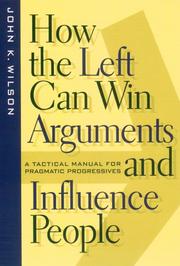| Listing 1 - 10 of 87 | << page >> |
Sort by
|
Book
ISBN: 9780226085661 9780226085838 Year: 2014 Publisher: Chicago University of Chicago Press
Abstract | Keywords | Export | Availability | Bookmark
 Loading...
Loading...Choose an application
- Reference Manager
- EndNote
- RefWorks (Direct export to RefWorks)
Book
ISBN: 9781412811262 Year: 2011 Publisher: New Brunswick Transaction
Abstract | Keywords | Export | Availability | Bookmark
 Loading...
Loading...Choose an application
- Reference Manager
- EndNote
- RefWorks (Direct export to RefWorks)
Pragmatism --- Progressivism (United States politics) --- Sociology --- History

ISBN: 0814784585 0814793622 0814793630 Year: 2001 Publisher: New York, N.Y. : New York University Press,
Abstract | Keywords | Export | Availability | Bookmark
 Loading...
Loading...Choose an application
- Reference Manager
- EndNote
- RefWorks (Direct export to RefWorks)
If we were to rely on what the pundits and politicians tell us, we would have to conclude that America is a deeply conservative nation. Americans, we hear constantly, detest government, demand lower taxes and the end of welfare, and favor the death penalty, prayer in school, and an absolute faith in the free market. And yet Americans believe deeply in progressive ideas. In fact, progressivism has long been a powerful force in the American psyche. Consider that a mere generation ago the struggle for environmentally sound policies, for women's rights, and for racial equality were fringe movement
Book
ISBN: 9781009002080 1009002082 1316518663 9781316518663 9781009009881 1009007505 1009008277 9781009007504 9781009008273 Year: 2024 Publisher: Cambridge Cambridge University Press
Abstract | Keywords | Export | Availability | Bookmark
 Loading...
Loading...Choose an application
- Reference Manager
- EndNote
- RefWorks (Direct export to RefWorks)
Why are progressives often critical of US foreign policy and the national security state? What would a statecraft that pulls ideas from the American left look like? Grand Strategies of the Left brings the progressive worldview into conversation with security studies and foreign policy practice. It argues that American progressives think durable security will only come by prioritizing the interconnected conditions of peace, democracy, and equality. By conceiving of grand strategy as worldmaking, progressives see multiple ways of using foreign policy to make a more just and stable world. US statecraft - including defense policy - should be retooled not for primacy, endless power accumulation, or a political status quo that privileges elites, but rather to shape the context that gives rise to perpetual insecurity. Progressive worldmaking has its own risks and dilemmas but expands how we imagine what the world is and could be.
Book
Year: 1954 Publisher: Syracuse : Syracuse University Press,
Abstract | Keywords | Export | Availability | Bookmark
 Loading...
Loading...Choose an application
- Reference Manager
- EndNote
- RefWorks (Direct export to RefWorks)
Progressivism (United States politics) --- United States --- Politics and government
Periodical
Abstract | Keywords | Export | Availability | Bookmark
 Loading...
Loading...Choose an application
- Reference Manager
- EndNote
- RefWorks (Direct export to RefWorks)
Presents the online version of the "Progressive Populist," a monthly newspaper related to progressive politics. Presents the table of contents and selected articles and editorials from the current issue. Offers access to back issues, subscription information, and related essays. Posts contact information for the editorial office in Austin, Texas, via street address, telephone number, and e-mail. Notes that the "Populist" is an employee-owned newspaper and is not supported by the Democratic Party.
Progressivism (United States politics) --- Populism --- Politics, Practical --- United States.
Book
ISBN: 0465046312 Year: 1982 Publisher: New York (N.Y.): Basic Books
Abstract | Keywords | Export | Availability | Bookmark
 Loading...
Loading...Choose an application
- Reference Manager
- EndNote
- RefWorks (Direct export to RefWorks)
Progressivism (United States politics) --- United States --- Politics and government
Book
ISBN: 0531053598 Year: 1974 Publisher: New York New viewpoints
Abstract | Keywords | Export | Availability | Bookmark
 Loading...
Loading...Choose an application
- Reference Manager
- EndNote
- RefWorks (Direct export to RefWorks)
Progressivism (United States politics) --- United States --- Politics and government
Book
Year: 1960 Publisher: New York : Oceana Publications,
Abstract | Keywords | Export | Availability | Bookmark
 Loading...
Loading...Choose an application
- Reference Manager
- EndNote
- RefWorks (Direct export to RefWorks)
Progressivism (United States politics) --- United States --- Politics and government.
Book
ISBN: 1501714198 Year: 2018 Publisher: Ithaca, NY : Cornell University Press,
Abstract | Keywords | Export | Availability | Bookmark
 Loading...
Loading...Choose an application
- Reference Manager
- EndNote
- RefWorks (Direct export to RefWorks)
The Revolution of '28 explores the career of New York governor and 1928 Democratic presidential nominee Alfred E. Smith. Robert Chiles peers into Smith's work and uncovers a distinctive strain of American progressivism that resonated among urban, ethnic, working-class Americans in the early twentieth century. The book charts the rise of that idiomatic progressivism during Smith's early years as a state legislator through his time as governor of the Empire State in the 1920s, before proceeding to a revisionist narrative of the 1928 presidential campaign, exploring the ways in which Smith's gubernatorial progressivism was presented to a national audience. As Chiles points out, new-stock voters responded enthusiastically to Smith's candidacy on both economic and cultural levels.Chiles offers a historical argument that describes the impact of this coalition on the new liberal formation that was to come with Franklin Delano Roosevelt's New Deal, demonstrating the broad practical consequences of Smith's political career. In particular, Chiles notes how Smith's progressive agenda became Democratic partisan dogma and a rallying point for policy formation and electoral success at the state and national levels. Chiles sets the record straight in The Revolution of '28 by paying close attention to how Smith identified and activated his emergent coalition and put it to use in his campaign of 1928, before quickly losing control over it after his failed presidential bid.
| Listing 1 - 10 of 87 | << page >> |
Sort by
|

 Search
Search Feedback
Feedback About UniCat
About UniCat  Help
Help News
News